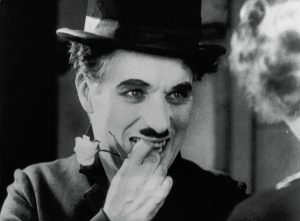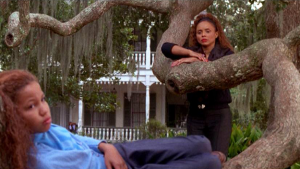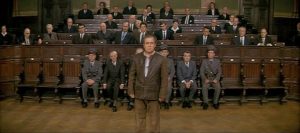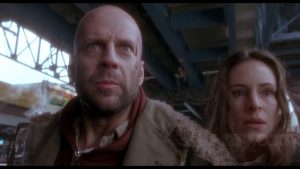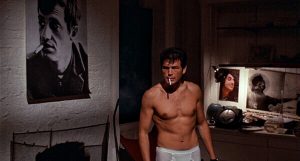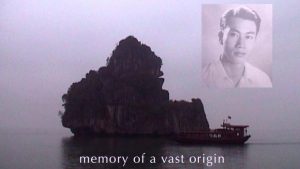CITY LIGHTS
Charles Chaplin (U.S. 1931) 87 min. 35MM. With Chaplin, Virginia Cherrill, Florence Lee.
City Lights may be Chaplin’s most cherished Little Tramp film. The writer-director-star achieved new levels of grace, in both physical comedy and dramatic poignancy, with this tale of a lovable vagrant falling for a young blind woman who sells flowers on the street (Cherrill) and mistakes him for a millionaire. Though made after the advent of sound, Chaplin remained steadfast in his love for the expressive beauty of the pre-talkie form. The result was the crowning achievement of silent comedy. Playing with Begone Dull Care (Norman McLaren and Evelyn Lambart, Canada, 1949, 8 min.); and The Love Life of an Octopus (Geneviève Hamon and Jean Painlevé, France, 1965, 13 min.).
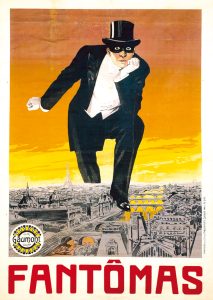 FANTÔMAS III
FANTÔMAS III
Louis Feuillade (France 1913) ~90 min. With René Navarre, Georges Melchior, Edmund Bréon. French with English intertitles.
Louis Feuillade’s outrageous, ambitious Fantômas series became the gold standard of espionage serials in pre-WWI Europe. René Navarre stars as the criminal lord of Paris, the master of disguise, the creeping assassin in black: Fantômas. Resourceful Inspector Juve (Bréon) and his friend, journalist Jerôme Fandor (Melchior), pursue him. We’ll screen The Murderous Corpse, the third feature of the 5 1/2-hour epic.
Playing with Alice Guy-Blaché’s early sound short Felix Mayol Performs “White Lilacs,” (France, 1905, 3 min., unsubtitled) and her silent role-reversal comedy The Consequences of Feminism (France, 1906, 7 min.). The pioneering Guy-Blaché was probably the only woman director in the earliest decade of cinema, and the producer of nearly 1000 films (only 350 of which survive).
Tuesday, September 4 at 1:30pm
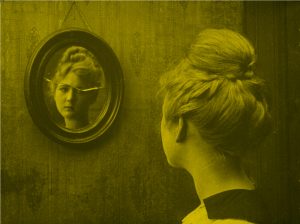
SHOES – Restoration!
Lois Weber (U.S. 1916) 52 min. DCP. With Mary MacLaren, Mattie Witting, Harry Griffith and a score by Donald Sosin and Mimi Rabson.
Lois Weber was the most important and prolific American woman director of the silent era, well known in her time and now finally getting contemporary recognition thanks to recent restorations by Milestone Films and the EYE Filmmuseum in Amsterdam. Shoes, the story of a poor shop girl struggling to support her family, may be Weber’s finest film and one of the great feminist films in the history of cinema.
Playing with D.W. Griffith’s The House of Darkness (U.S. 1913, 17 min.), innovative director D.W. Griffith’s dramatic but sympathetic spotlight on the mentally ill.
Tuesday, September 11 at 1:30pm
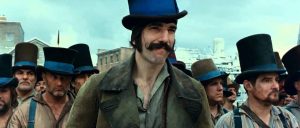
GANGS OF NEW YORK
Martin Scorsese (U.S. 2002) 167 min. 35MM. With Leonardo DiCaprio, Cameron Diaz, Daniel Day-Lewis.
Martin Scorsese’s ambitious epic uses the visual language of the American Western to tell a very urban story: the history of New York’s development in the wake of the Civil War. Leonardo DiCaprio is a young man bent on vengeance whose nemesis, the evil but seductive Bill the Butcher (Day-Lewis), leads the city’s anti-immigrant “nativist” movement (American Cinematheque notes).
TOP OF PAGE
Tuesday, September 18 at 1:30pm 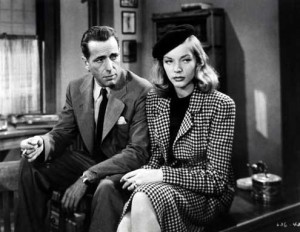
THE BIG SLEEP
Howard Hawks (U.S. 1946) 116 min. 35MM. With Humphrey Bogart, Lauren Bacall, John Ridgely.
A classic noir tale of crime, seduction, deception and murder, crafted by a dream team of talent. Raymond Chandler’s acidic novel begat the second of the Bacall-Bogart-Hawks collaborations, a feast packed with quotables from Chandler and screenwriters William Faulkner, Leigh Brackett and Jules Furthman.
Playing with the Bugs Bunny Looney Tunes cartoon The Big Snooze (Bob Clampett, U.S. 1946, 7 min.).
TOP OF PAGE
Tuesday, September 25 at 1:30pm
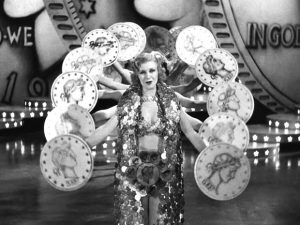 GOLD DIGGERS OF 1933
GOLD DIGGERS OF 1933
– Preservation Print!
Mervyn LeRoy and Busby Berkeley (U.S. 1933) 96 min. 35MM. With Joan Blondell, Ruby Keeler, Dick Powell.
Despite his benign reputation as an entertainer, dance designer Busby Berkeley’s imagination was truly bizarre, provocatively mischievous if you were paying attention – and there’s no reason to think people in 1933 were not. Ginger Rogers sings “We’re In the Money” in pig Latin, backed by chorines wearing coins over their private parts; in “Pettin in the Park,” Berkeley cuts to a caged chimpanzee on a cookie box, a voyeuristic midget and women’s metallic bathing suits – which men pry open with can openers. It’s the Depression, and it’s a jungle out there, as the working-girls plot of Gold Diggers of 1933 cynically demonstrates (PFA program notes). Preserved by the Library of Congress.
TOP OF PAGE
Tuesday, October 2 at 1:30pm
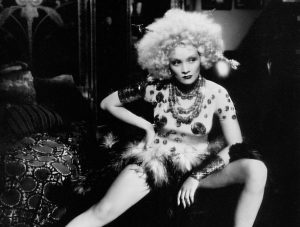 BLONDE VENUS
BLONDE VENUS
Josef von Sternberg (1932) 97 min. 35MM. With Marlene Dietrich, Herbert Marshall, Cary Grant.
A sweeping melodrama about motherly devotion, Blonde Venus tells the story of Helen (Dietrich), once a German chanteuse, now an American housewife, who resurrects her stage career after her husband (Marshall) falls ill; she then becomes the mistress of a millionaire (Grant), sliding from loving martyr to dishonored woman. Von Sternberg’s baroque visual style shines, in a parade of visionary costumes he designed with Dietrich’s longtime collaborator Travis Banton.
Playing with The Meeting of Two Queens (Cecilia Barriga, Spain, 1991, 14 min.)
EVE’S BAYOU
Kasi Lemmons (U.S. 1997) 109 min. 35MM. With Samuel L. Jackson, Jurnee Smollett-Bell, Meagan Good.
“The ghost of Tennessee Williams hovers over Eve’s Bayou, which takes place in a moss-draped Louisiana backwater, and the family under observation is as ripe with desires, disappointments, and the mysterious scent of sex as any in Mr. Williams’ neighborhood. But the notable accomplishment of actress-writer Kasi Lemmons (The Silence of the Lambs) in her feature directorial debut is in creating a landscape quite beautiful and entirely her own — a fluid, feminine, African-American, Southern gothic narrative that covers a tremendous amount of emotional territory with the lightest and most graceful of steps” (Lisa Schwarzbaum, Entertainment Weekly).
Tuesday, October 23 at 1:30pm
THE WITNESS (A TANÚ)
Péter Bacsó (Hungary 1969) 103 min. With Ferenc Kállai, Lajos Öze, Béla Both. Hungarian with English subtitles.
A legendary and hilarious satire about communism, The Witness was banned for over a decade in Hungary and has become a cult classic. Set during the height of the Rákosi Era, which was closely modeled after the Stalin regime, the film follows the life of an ordinary dike keeper who has been caught for illegally slaughtering his pig; but instead of being punished he is elevated into an important position generally reserved for the communist elite. In Hungarian film history, The Witness is unequaled – some of its dialogue, revealing the outrageous absurdity of dictatorship, has become proverbial.
Tuesday, October 30 at 1:30pm
TWELVE MONKEYS
Terry Gilliam (U.S. 1995) 129 min. With Bruce Willis, Madeleine Stowe, Brad Pitt.
Monty Python comedy troupe member Terry Gilliam directed this sci-fi update on Chris Marker’ most famous film, La Jetée (1962). Bruce Willis is Gilliam’s time traveler, sent from 2035 back to 1990, with the mission of preventing a devastating plague that will wipe out most of the Earth’s population.
MEDIUM COOL
Haskell Wexler (U.S. 1969) 110 min. 35MM. With Robert Forster, Verna Bloom, Peter Bonerz.
In 1968, the whole world was watching the social upheaval in the U.S., and famed cinematographer Haskell Wexler (Who’s Afraid of Virginia Woolf?) decided to make a film about what the hell was going on. Medium Cool, his debut feature, plunges us into the moment. With its mix of fictional storytelling and documentary technique, this depiction of the working world and romantic life of a television cameraman (Forster) is a visceral snapshot of the era, climaxing with an extended sequence shot in the middle of the riots surrounding the Democratic National Convention in Chicago. An inventive commentary on the pleasures and dangers of wielding a camera, Medium Cool is as prescient a political film as Hollywood has ever produced. (Adapted from Criterion Collection notes.) Print courtesy of the Academy Film Archive.
Tuesday, November 13 at 1:30pm
FORGETTING VIETNAM
Trinh T. Minh-ha (US/South Korea/Germany 2015) 90 min.
One of the myths surrounding the creation of Vietnam involves a fight between two dragons whose intertwined bodies fell into the South China Sea and formed Vietnam’s curving S-shaped coastline. Influential feminist theorist and filmmaker Trinh T. Minh-ha’s lyrical film essay commemorating the 40th anniversary of the end of the war draws inspiration from ancient legend and from water, a force evoked in every aspect of Vietnamese culture. Images of contemporary life unfold, as fragments of text and song evoke the echoes and traces of a trauma of international proportions.
Tuesday, November 27 at 1:30pm
THE SOCIAL NETWORK
David Fincher (U.S. 2010) 120 min. 35MM. With Jesse Eisenberg, Andrew Garfield, Justin Timberlake.
Seven years after Harvard undergrad Mark Zuckerberg (Eisenberg) began heatedly working on a new idea that would help define a zeitgeist and revolutionize communication, David Fincher told Facebook’s origin story. Questions about power and privacy raised by Aaron Sorkin’s script resonate eight years later, and how.
